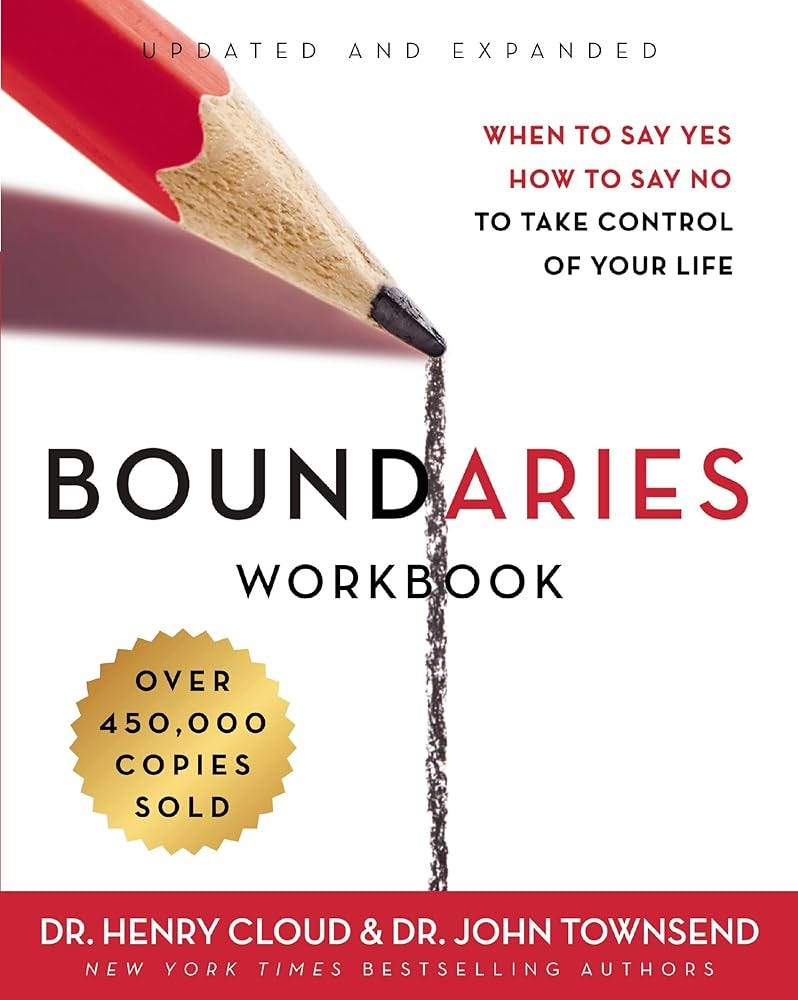How to Protect Your Sanity and Your Peace Without Feeling Guilty
Reclaim Control Over Your Life Now
Dear Permission to be Powerful Reader,
Boundaries by Dr. Henry Cloud and Dr. John Townsend changed my life.
It’s not just about saying “no”—it’s about owning your life.
Boundaries are the invisible force fields that define who we are, what we allow, and refuse to tolerate.
They determine our relationships, our self-worth, and ultimately, our destiny. Yet, many of us were never taught how to set them.
Instead, we were conditioned to believe that being “good” means being endlessly available. That saying “yes” when we want to say “no” makes us kind, loyal, and loving. Putting ourselves last is the price of being a “decent” person.
But that’s a lie.
What Are Boundaries?
At their core, boundaries are where you end and another person begins. They define your physical, emotional, and mental space.
Without them, you become an extension of someone else’s will—drifting, controlled, and lost in a sea of other people’s needs.
Dr. Cloud and Dr. Townsend define boundaries as personal property lines.
Just like a fence marks where your yard ends and your neighbor’s begins, a boundary makes it clear what belongs to you—your time, your emotions, your decisions.
A healthy boundary is saying:
“I am responsible for my happiness, not yours.”
“Your problems are not mine to solve.”
“I don’t owe you access to my time, energy, or emotions.”
Without boundaries, people take more than they give. They invade, manipulate, guilt-trip, and suffocate. And the worst part? They don’t even know they’re doing it—because you never said no.
Why Most People Struggle with Boundaries
Most of us were never taught how to set boundaries. We learned early on that saying “no” leads to disappointment, conflict, or rejection.
In childhood, we were told to obey without question.
In relationships, we were guilt-tripped into prioritizing others.
At work, we were taught that “going the extra mile” meant sacrificing personal time.
And if you grew up in a family where boundaries were ignored or violated, you learned that love equals enmeshment. That saying no makes you selfish. That prioritizing yourself is wrong.
Dr. Cloud and Dr. Townsend argue that without boundaries, people lose themselves. They become resentful, exhausted, and trapped in cycles of over-giving.
But here’s the truth:
Boundaries are not selfish. They are the foundation of love, self-respect, and freedom.
What Happens When You Lack Boundaries?
When you live without boundaries, your life isn’t your own.
People take advantage of you.
You feel guilty for prioritizing yourself.
You end up in toxic relationships, where your needs don’t matter.
You attract controlling or emotionally needy people.
You feel constantly drained, with nothing left for yourself.
It doesn’t happen overnight. It happens in small moments of silence. The times you wanted to say no but didn’t. The times you felt disrespected but stayed quiet. The times you kept giving, giving, giving—until there was nothing left of you.
But it doesn’t have to be this way.
How to Set Boundaries Without Guilt
Once you realize you need boundaries, the next challenge is actually enforcing them.
At first, it feels unnatural. If you’ve spent your whole life saying “yes” out of obligation, saying “no” will feel like rebellion. You’ll feel guilty. You’ll second-guess yourself.
And the people who benefitted from your lack of boundaries? They won’t like the change.
But remember this: people who truly love you will respect your boundaries. Those who don’t were only interested in controlling you.
So how do you start?
1. Recognize That Your Time and Energy Are Yours
The first step is understanding that you have a right to your own life.
You don’t owe anyone constant access to your time.
You are not responsible for managing other people’s emotions.
You don’t need permission to prioritize yourself.
One of the most powerful lessons from Boundaries is this: You teach people how to treat you.
If you’ve always been available, always said yes, always dropped everything for others—people will expect it.
But when you start protecting your time and energy, the right people will adapt. The wrong ones will lash out.
That’s how you know who actually cares about you, and who only cared about what you could give them.
2. Stop Explaining Yourself
A common mistake when setting boundaries is feeling the need to justify them.
“I can’t make it because I’m really tired.”
“I’d love to help, but I have so much on my plate.”
“I wish I could, but I don’t think I have time.”
Stop.
You don’t owe anyone a long explanation.
A simple “No, I won’t be able to” is enough.
Weak boundaries beg for approval. Strong boundaries stand firm.
3. Expect Resistance (But Hold the Line)
When you set boundaries, some people will react badly.
They’ll say you’ve changed.
They’ll call you selfish.
They’ll try to make you feel guilty.
Let them.
When people are used to controlling you, your freedom will feel like a threat.
That’s their issue, not yours.
4. Set Boundaries with Love (But Don’t Back Down)
Boundaries don’t have to be harsh. You can set them with warmth, honesty, and kindness.
“I love you, but I can’t be available all the time.”
“I care about you, but I need space for myself too.”
“I respect you, and I ask you to respect my limits.”
Healthy boundaries aren’t about pushing people away. They’re about creating space for the right relationships to thrive.
5. Enforce Consequences
A boundary without consequences is just a suggestion.
If someone keeps pushing past your limits, you need to follow through.
If they violate your time, limit access to you.
If they ignore your needs, step back from the relationship.
If they disrespect you, remove yourself from their influence.
People who respect you will adjust. Those who don’t? They were never really in your corner.
What Happens When You Start Setting Boundaries?
At first, life might feel chaotic. Some relationships will change—or even end.
But then something incredible happens: peace.
You stop feeling drained. You stop resenting people. You stop living for others and start living for yourself.
You gain self-respect, clarity, and emotional freedom.
And the best part?
The relationships that remain will be healthier, stronger, and built on real mutual respect.
Protecting Your Peace
Boundaries are more than just personal limits; they are a declaration of self-worth. When you set boundaries, you’re telling the world:
➡️ My time is valuable.
➡️ My energy is precious.
➡️ I am responsible for my own life, not yours.
This isn’t selfish—it’s survival.
Without boundaries, life becomes an endless cycle of exhaustion. You say yes when you mean no. You feel trapped in relationships you don’t want to be in. You let people take more than they give.
But once you take control of your space, your mind, and your emotions, everything changes.
You reclaim your peace.
And when you protect your peace, you start living life on your own terms.
Boundaries and Relationships: Knowing Who Deserves a Seat at Your Table
One of the most powerful revelations in Boundaries by Cloud and Townsend is this:
➡️ The right people will respect your limits. The wrong people will see them as obstacles.
When you start enforcing boundaries, you’ll notice a shift in your relationships. Some people will adjust. Others will resist. And some will walk away completely.
Let them.
Not everyone deserves access to you.
The people who truly care about you will respect your growth. The ones who only wanted control? They’ll leave when they realize they can’t manipulate you anymore.
That’s not a loss—it’s a blessing.
Signs Someone Respects Your Boundaries:
✅ They listen when you express a need.
✅ They don’t guilt-trip you for saying no.
✅ They honor your space and independence.
✅ They communicate openly and without manipulation.
Signs Someone Disrespects Your Boundaries:
❌ They push you to do things you don’t want to do.
❌ They make you feel guilty for choosing yourself.
❌ They punish you with silent treatment or anger when you say no.
❌ They expect constant access to your time and energy.
When you start setting boundaries, you’ll quickly see who falls into each category.
Your job? Act accordingly.
Boundaries at Work: Protecting Your Time and Sanity
Work is one of the biggest areas where people struggle to set boundaries.
Why?
Because we’ve been conditioned to believe that being a good employee means being constantly available.
But the truth is, burnout isn’t a badge of honor.
If you don’t set boundaries at work, here’s what happens:
🚨 You take on more than you can handle.
🚨 You get stuck in a cycle of overwork and exhaustion.
🚨 You feel resentful, undervalued, and depleted.
Here’s how to fix it:
How to Set Boundaries at Work
➡️ Stop answering emails and messages after work hours. Your free time is yours.
➡️ Communicate your workload clearly. “I can take this on, but I’ll need more time or support.”
➡️ Say no without guilt. “I’d love to help, but I can’t take on more right now.”
➡️ Don’t let work define your worth. You are more than your job.
A job that expects your entire life isn’t a job—it’s a trap.
Set boundaries early. Protect your time. And remember: you work to live, not the other way around.
The Fear of Setting Boundaries (And How to Overcome It)
One of the biggest reasons people don’t set boundaries is fear.
⚠️ Fear of disappointing others.
⚠️ Fear of losing relationships.
⚠️ Fear of being seen as selfish.
But here’s the reality: Healthy people respect boundaries. Unhealthy people don’t.
If setting boundaries makes someone angry, that’s a sign they were benefitting from your lack of them.
So ask yourself:
➡️ Am I willing to live my life for other people?
➡️ Am I okay with constantly feeling drained and exhausted?
➡️ What’s more important—keeping everyone happy or protecting my own happiness?
At the end of the day, your well-being is your responsibility.
You don’t owe anyone your peace.
And once you accept that, everything changes.
The Boundary Revolution: How Life Transforms When You Take Control
Imagine a life where:
✔️ You say no without guilt.
✔️ You protect your time and energy.
✔️ You surround yourself with people who respect you.
✔️ You live on your terms—not anyone else’s.
That life is possible.
And it starts with one simple truth:
🚨 YOU ARE ALLOWED TO HAVE BOUNDARIES. 🚨
➡️ You don’t have to be available 24/7.
➡️ You don’t have to fix other people’s problems.
➡️ You don’t have to explain or justify your limits.
Your life belongs to you.
And the moment you start setting boundaries, you’ll feel something you haven’t felt in a long time:
Freedom.
Until next time,
Dancer, Writer, Buddhist.





People teach boundaries but no one does it like you did here Anton 💯 I always say one thing; the first step to doing something right is recognizing that there is something wrong...
Thank you so much for this and God bless you, you're the best.